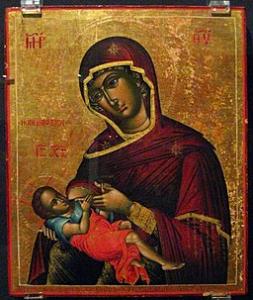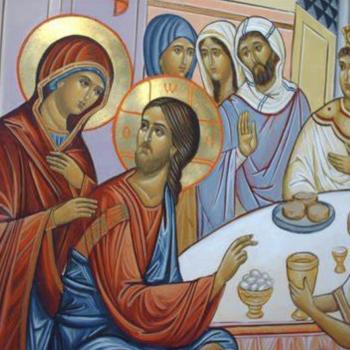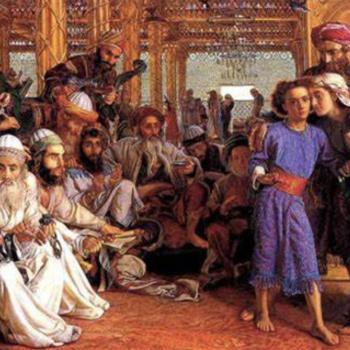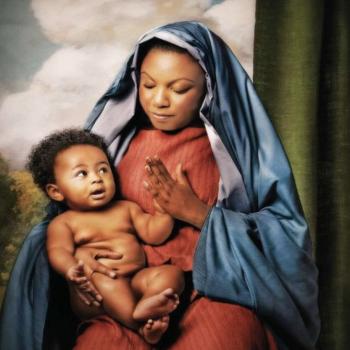The incarnation is cosmic in its significance. God the Word, the Logos, became man. He who is the first and the last, the alpha and omega, the beginning and the end, entered into time. The eschaton was immanentized. Heaven joined with earth. All of creation found itself included in the work and ministry of Jesus Christ as the one who is Lord over entered into the world to become the servant of all. The waters were made pure and holy as he was baptized into the Jordan. The earth not only received his body when it was placed in the tomb, but it also received his blood, both when tears of blood flowed down his face as well as when his body was pieced and placed upon the cross. The heavens opened up and received Jesus as he ascended into the kingdom of God. He who lowered himself to the depths of the abyss raised himself up and took with him all that he found, reconfiguring the whole of creation, healing it from the wounds of sin.
The Logos who created all things became the servant of all things in order to open up creation to the kingdom of God. The whole of creation is deified by him. For those who have eyes to see, they can discern that all that he said and did had an effect on all things, as all things are interconnected with each other.
Through her relationship with Jesus, being his mother, Mary, likewise found her life to be cosmic in significance. This is not because we can see her interacting with creation in the same fashion as Jesus; she was only human, and as such, she acted with creation in a perfectly human fashion. But the consequences of her extraordinary and yet ordinary life filled the whole of creation with graces; the whole of creation is linked together as one in Jesus, and it is through Mary that this union took place, as St. Maximus declared in wonder:
Truly you have surpassed the limits of nature, not only in the unfathomable Nativity, but also in preternatural benevolence. Through you the curse of the first mother has been undone. Through you the dividing wall of hostility has been torn down (cf. Eph 2.13). Through you the dominion of death has been destroyed. Through you we have become victorious over sin. Through you virginity has been planted among humanity. Through you we have learned courage in good deeds. Through you we have been given wisdom, humility, love, and every other virtue.¹
Heaven and earth are one in Jesus; St. Maria Maddalena de’ Pazzi expressed this in her many peculiar spiritual dialogues, such as how she described Mary nurturing heaven and earth through her breasts:
desire inspired, love inflamed, will comforted, intellect glared and died [silence] with the right breast she sprinkled and nourished heaven and with the left [she sprinkled and nourished] earth; one makes sprout the other makes fructify. You could really say that you were mother of every beautiful charity [silence] your charity had every beauty, even though it could only be a superior beauty because it joined the Word and adjusted to It; and [even though] it could be measured with the Word’s measurement [silence] her face had those beautiful eyes; with one she looked with compassion and with the other [she looked] in order to grant fruition of it [silence] that sweet mouth that tasted his indescribable glory, and our infinite nothingness.²
Traditional understanding of “right and left,” with the right being greater than the left, help us understand the application St. Maria Maddalena implied with her expression. Mary’s right breast is said to nourish the heavens and the left, the earth, because in Jesus we find the combination of heaven with earth, and so he takes and is nourished in both fashions. Likewise, as he was nourished by Mary, Jesus takes what is given by her and shares it with the whole of creation. The mere act of breastfeeding, a normal, typical activity of mothers done daily, is shown to be a thing of great beauty, a thing of great holiness, a thing which demonstrates Mary’s cosmic significance. It is not that Mary is herself literally sprinkling the heavens and the earth with her milk, but rather, it is in the self-giving love of breastfeeding, the whole of creation is shown to benefit from her love. She is great not because she did wondrous miracles, but because she was truly human, truly a woman who embraced the glory of her maternity. For it is in ordinary activity true greatness can be found; we do not have to go seeking it out as if the kingdom of God is outside of ourselves.
The world needs healing, and this is done in acts of selfless devotion, in acts of love. Greatness accepts the small, ordinary things of life and finds in them true greatness. Mary, to many, would have been seen as an ordinary Jewish woman of her time. Those who look for glory will not see it in her, because she did not have to show off to have such glory. It was always with her, and it can be with us in similar fashion. All we need to do is be like her and follow after the depth of glory revealed in Jesus, a glory which is established in self-kensosis instead of self-promotion. Those who hold on to themselves do not make room for grace, while those who open themselves up and engage others in love, denying any attempt of vainglory, make room for the grace and virtue they need for true greatness. It is because of her perfect love revealed in her humility she was revealed as queen over all, as St. Maximus the Confessor understood:
But more than anyone else, her holy soul was full of benevolence and compassion, and in this way she was more than anyone else an imitator of her good and compassionate son, having a tranquil and humble mind with such an abundance of virtue and excess of grace. Truly she was the queen exalted above every nature in word and deed, and thought, for she was to become the mother of the true king of all things who then became poor and was humbled for our sake unto death by death on a cross (Phil. 2.8).³
Mary’s cosmic significance is found in her willingness to embrace the ordinary with all her love so as to raise it up as something extraordinary. She found God immanent in creation before she found him inside herself, taking of herself and her love, transforming what was taken to be a part of himself. Thus, St. John of Damascus, talking about her, said:
You are called the spiritual Eden, holier and more divine than that of old; for in the former Eden the earthly Adam dwelt, but in you the Lord from heaven. The ark prefigured you (cf. Gen. 6:14), in that it guarded the seeds of a second world; for you gave birth to Christ, the world’s salvation, who overwhelmed sin and calmed its ways. 4
Mary did not seek greatness for herself, she was not attached to it. She was able to find the great things in the world right in front of her; whatever was to be done in the moment was enough, and yet because of the way the world is interconnected, it was also the means by which she influenced the whole of creation. All that happens in creation is interconnected; greatness is achieved in doing what should be done when it is motivated by a pure, simple love. Mary was queen of heaven because she did not forget her place on earth.
We are now called to imitate her; we should give birth to the Son in our lives, to be simple in our actions and great in love, so that what we do can and will be raised up to heaven, revealing in that assumption, the cosmic significance which is to be found in the virtue of our everyday deeds. Mary’s greatness not just something for us to sing about, but something which should inspire us, to help us realize that what we do matters, even if our life seems stuck in the mire of the earth.
1 St. Maximus the Confessor, The Life of The Virgin. Trans. Stephen J. Shoemaker (New Haven: Yale University
Press, 2012), 156.
2 St. Maria Maddalena de’ Pazzi. “The Dialogues” in Selected Revelations. Trans. Armandon Maggi (New York:
Paulist Press, 2000), 100.
3 St. Maximus the Confessor, The Life of The Virgin. Trans. Stephen J. Shoemaker (New Haven: Yale University
Press, 2012), 44.
4 St. John of Damascus, “Homily I On The Dormition” in On the Dormition: Early Patristic Homilies. Trans. Brian
E. Daley, S.J. (Crestwood, NY: St. Vladimir’s Seminary Press, 1998), 192.
Henry Karlson is a Byzantine Catholic and independent scholar. He is the author of the book The Eschatological Judgment of Christ, published by Wipf and Stock. He blogs on A Little Bit of Nothing.













